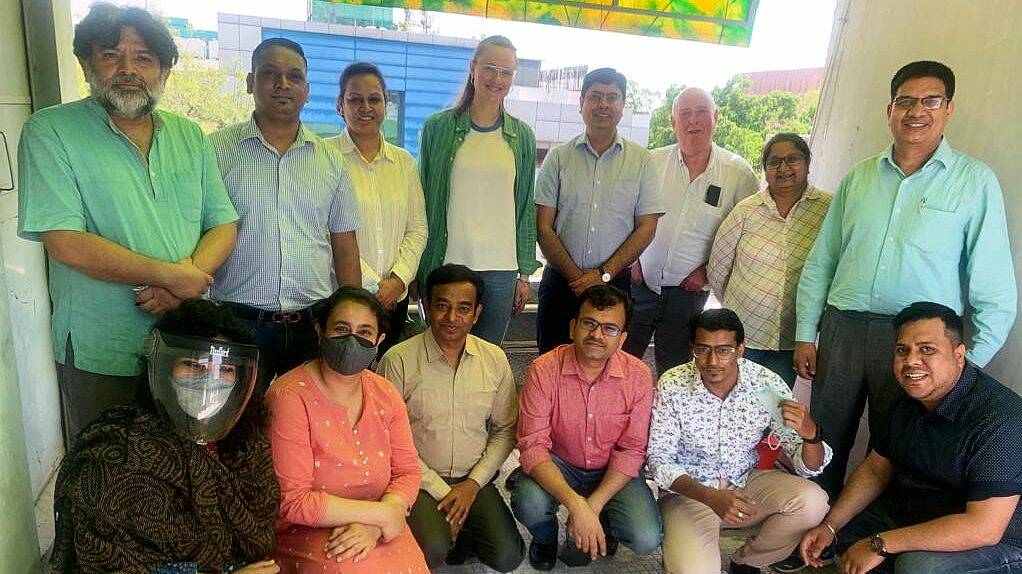South Asia Regional Office
Our regional office in New Delhi coordinates the Rosa Luxemburg Foundation’s projects with partners across South Asia and activities in India, Nepal, Bangladesh, Pakistan, Afghanistan, and Sri Lanka
South Asia is a region riven by contradictions: many areas are currently experiencing rapid economic growth, while their populations remain exposed to severe poverty. India produces so much rice and wheat per year that it has begun exporting its surplus grain.
Despite this fact, millions of children in India suffer from undernourishment and malnutrition. Climate change exposes countries such as Bangladesh to increasingly violent natural disasters, forcing more and more people to leave their homes. The lack of economic prospects in rural areas is driving many people to migrate to urban areas, where they hope to find work and build a future.
Far too often, however, these dreams are dashed and migrants end up in the slums of the region’s megacities. Corruption is widespread, preventing sustainable and inclusive economic development.
While soldiers from South Asia make up a significant part of UN peacekeeping troops across the world, a large number of violent internal conflicts are destabilizing the subcontinent. Countries such as Nepal and Sri Lanka are still trying to overcome the repercussions of civil wars that remain difficult for the population to process. Adding to this are decades of political tension between India and Pakistan, which affect and shape the entire region.
Against this backdrop, forces from within civil society are often the ones to address these challenges and formulate solutions. In fact, ever since South Asian states gained independence from British colonial rule, social movements and NGOs have proven crucial to shaping the region’s political, economic, and social development. They also draw attention to the deficits of state-centred development models, which often fail to integrate environmental and social aspects. In response to such criticism, some of the region’s governments have attempted to undermine civic engagement by infringing on civil liberties.
Activities
The Rosa Luxemburg Stiftung in South Asia works with civil society actors on issues related to rural development, workers’ rights, and social transformation, and promotes their networking activities. Projects are developed and implemented in close cooperation with NGOs and academic institutions such as universities and think tanks.
- Agriculture and Food Sovereignty
In India alone, some two thirds of the country’s population of 1.3 billion are directly or indirectly reliant upon agriculture, although the sector accounts for a mere 14 percent of the country’s GDP. Agriculture has been hit by a major crisis throughout South Asia. Those suffering the most are the millions of peasant farmers, as they struggle to eke out a living.
Together with partner organizations, the Rosa Luxemburg Foundation facilitates dialogue on issues such as food sovereignty and promotes sustainable and environmentally friendly farming methods as well as independent access to resources such as seeds. The foundation embraces a diversity of perspectives by working together with academic institutions as well as grassroots organizations and indigenous populations. It also engages with farmers’ associations affiliated with left-wing parties and open to technological progress in agriculture. - Labour Organizing
It is estimated that more than 90 percent of South Asia’s working population are employed in the so-called “informal sector”, i.e. where labour provisions are barely implemented or respected. At the same time, however, countries such as India have subjected their labour laws to sweeping reforms in recent years, including the addition of employer-friendly changes in the formal sector that have helped relax safeguards against redundancy.
The Rosa Luxemburg Foundation therefore supports programmes that address precarious working conditions. Moreover, its partner organizations focus on understanding labour migration and its causes, as every year millions of people abandon their homes in rural areas in search of work in urban industrial sectors or on large-scale agricultural plantations. The foundation promotes programmes that help these people know their rights. In addition, it organizes events aimed at, for instance, making German consumers aware of the issues faced by South Asian textile workers. - Critical Concepts of Social Transformation
With civic education projects, the Rosa Luxemburg Foundation and its partner organizations foster discussions on critical left-wing concepts of social transformation in South Asia and bring together civil society actors as well as political and academic institutions. Together, our aim is to act as a hub facilitating a critical and analytical discourse on social and political issues.
In this vein, the foundation supports projects that examine regional political and social movements from a historical perspective and highlight how they have helped shape current conditions. Besides these activities, the foundation also analyses current political and social developments across the region.

New Delhi Regional Office
Director: Nadja Dorschner
Rosa Luxemburg Stiftung e.V.
Liaison Office New Delhi
C-15, SDA Market
New Delhi – 110016
India
+91 11 49204600